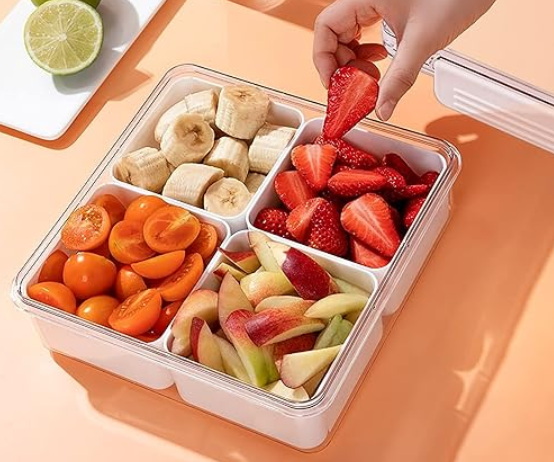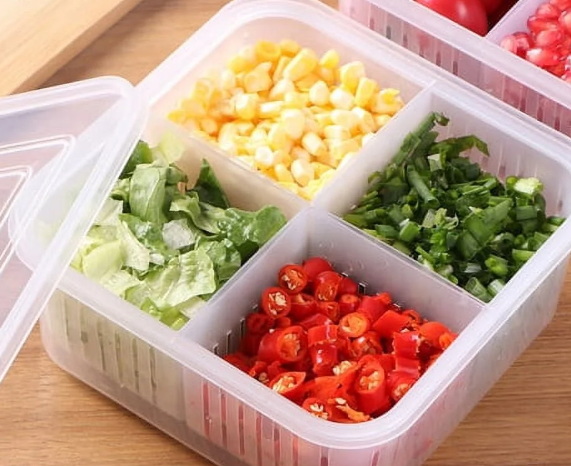
Content Menu
● Overview of the Australian Disposable Tray Market
● Key Trends in Disposable Tray Manufacturing
● Top Disposable Tray Manufacturers And Suppliers in Australia
>> 1. BioPak
>> 2. Pac Food
>> 3. Vivo Packaging
>> 4. Multisteps Industries
>> 5. EezyPak
>> 6. Extreme Packaging Solutions
>> 7. Vadals
>> 8. Neil Dempsey Packaging
>> 9. Ikonpack
>> 10. Amhil Australia
>> 11. Confoil Australia
● OEM and Customization Services
● Sustainability and Eco-Friendly Innovations
● Applications and Industry Use Cases
● Regulatory Environment and Compliance
● How to Choose the Right Supplier
● Conclusion
● Frequently Asked Questions
>> 1. What are the main materials used by Disposable Tray Manufacturers And Suppliers in Australia?
>> 2. Can I order custom-branded disposable trays for my business?
>> 3. Are eco-friendly disposable trays as durable as traditional plastic trays?
>> 4. How do I choose the right Disposable Tray Manufacturer And Supplier for my business?
>> 5. What is the outlook for the disposable tray market in Australia?
In the dynamic landscape of food service and hospitality, the demand for high-quality disposable trays continues to surge. As sustainability, convenience, and food safety become paramount, businesses across Australia are seeking reliable Disposable Tray Manufacturers And Suppliers to meet their evolving needs. This comprehensive guide delves into the leading players in the Australian market, their product offerings, and the latest trends shaping the industry. Whether you are a brand owner, wholesaler, or manufacturer looking for OEM services, this article provides valuable insights and practical guidance.

Overview of the Australian Disposable Tray Market
Australia's food packaging industry is experiencing robust growth, driven by the rise of takeaway culture, online food delivery, and increasing consumer awareness of sustainability. The market for disposable trays is expanding rapidly, with a strong shift towards eco-friendly, compostable, and recyclable solutions. In 2024, the Australian food packaging market reached USD 11.4 billion, with a projected CAGR of 5.2% through 2033. Disposable Tray Manufacturers And Suppliers are responding to this demand by offering innovative products that balance convenience, safety, and environmental responsibility.
Key Trends in Disposable Tray Manufacturing
- Sustainability: Manufacturers are prioritizing biodegradable, compostable, and recyclable materials such as sugarcane pulp, PLA bioplastic, and recycled PET (rPET).
- Customization: OEM and private label services are increasingly popular, allowing brands to differentiate with unique designs and branding.
- Food Safety: Advanced barrier technologies and modified atmosphere packaging (MAP) are extending shelf life and ensuring food safety.
- Versatility: Trays are designed for a range of applications, from ready meals and catering to airline and healthcare services.
- Regulatory Compliance: Stricter government regulations on single-use plastics are accelerating the adoption of sustainable alternatives.
Top Disposable Tray Manufacturers And Suppliers in Australia
1. BioPak
BioPak is a market leader in eco-friendly food packaging, offering a wide range of compostable trays made from rapidly renewable sugarcane pulp and plant fibers. Their products are 100% plastic-free and designed for the circular economy, making them a top choice for environmentally conscious businesses. BioPak's trays are available in various sizes and configurations, suitable for takeaways, catering, and events. The company is also known for its transparent eco-cost labeling, helping customers understand the environmental impact of their purchases.
2. Pac Food
Pac Food specializes in CPET and lined sugarcane trays, offering both standard and custom solutions for ready meals, catering, and airline food packaging. Their trays are known for durability, heat resistance, and compatibility with MAP and sous vide cooking. Pac Food's manual tray sealers are popular in commercial kitchens, ensuring efficient and secure sealing of meals for transport and storage. The company's focus on food safety and eco-friendly materials makes them a preferred supplier for many Australian businesses.
3. Vivo Packaging
Vivo Packaging offers a diverse range of disposable trays and lids, including multi-compartment options for takeaway and catering. Their products are designed for both flexibility and rigidity, catering to various food service needs. Vivo Packaging is recognized for its innovative approach and joint venture manufacturing, providing OEM and private label services to brands across Australia and beyond.
4. Multisteps Industries
Multisteps Industries operates a modern, 7,200-square-meter facility in Queensland, focusing on environmentally friendly CPET trays. Their products feature advanced oxygen barrier properties, extending food shelf life and supporting sustainability through rPET programs.
5. EezyPak
EezyPak is known for high-quality, APCO-certified CPET trays that are recyclable and designed to reduce environmental impact. Their commitment to compliance with national packaging regulations makes them a trusted partner for businesses seeking sustainable solutions.
6. Extreme Packaging Solutions
Extreme Packaging Solutions produces CPET trays ideal for ready-to-eat foods, emphasizing food safety, recyclability, and eco-friendly materials. Their trays are suitable for MAP and help preserve food flavor and freshness.
7. Vadals
Vadals manufactures CPET trays that are heat-resistant, recyclable, and suitable for freezing, microwaving, and oven heating. Their products serve a wide range of food businesses, including aged care facilities and airlines.
8. Neil Dempsey Packaging
Neil Dempsey Packaging offers custom CPET trays tailored to specific business needs, with a strong focus on sustainability and green manufacturing practices.
9. Ikonpack
Ikonpack is recognized for its innovative, environmentally friendly CPET trays and commitment to sustainable production methods. They are a member of the Australian Packaging Covenant, supporting recyclable and reusable packaging.
10. Amhil Australia
Amhil Australia produces durable, heat-resistant, and recyclable CPET trays, with a focus on ready-to-eat food packaging. Their PETInfinity recycling program and carbon-neutral certification highlight their dedication to sustainability.
11. Confoil Australia
Confoil Australia leads in CPET and eco-friendly food packaging, offering products made from recycled aluminum and biodegradable materials like DualPakECO® and wheat straw pulp trays. Their solutions support organic recycling and energy conservation.
OEM and Customization Services
Many Disposable Tray Manufacturers And Suppliers in Australia offer OEM and private label services, enabling international partners to customize products with their branding and specifications. This is particularly valuable for overseas brand owners, wholesalers, and manufacturers seeking to expand their product lines or enter new markets. Customization options include:
- Tray size, shape, and compartment configuration
- Material selection (biodegradable, compostable, recyclable)
- Branding and logo printing
- Packaging design and labeling
OEM services allow businesses to differentiate themselves in a competitive market, ensuring that their disposable trays align with their brand identity and operational requirements. Manufacturers often provide design support, prototyping, and flexible production runs to accommodate both large and small orders.

Sustainability and Eco-Friendly Innovations
Sustainability is at the core of the Australian disposable tray industry. Manufacturers are investing in:
- Biodegradable Materials: Sugarcane pulp, PLA bioplastic, and recycled PET are widely used.
- Compostable Solutions: Products designed for industrial and home composting, reducing landfill waste.
- Recyclable Packaging: Trays and lids that can be recycled through existing waste management systems.
- Energy-Efficient Production: Factories implementing energy conservation and emission reduction measures.
- Circular Economy Initiatives: Programs like PETInfinity encourage recycling and resource reuse.
These innovations not only help businesses meet regulatory requirements but also appeal to environmentally conscious consumers. Many manufacturers have achieved certifications such as APCO, ISO 14001, and carbon-neutral status, further demonstrating their commitment to sustainability.
Applications and Industry Use Cases
Disposable trays are essential across a wide range of industries and applications in Australia:
- Food Service and Takeaway: Restaurants, cafes, and food trucks rely on disposable trays for convenient and hygienic food delivery.
- Catering and Events: Multi-compartment trays and custom designs are popular for large-scale catering, parties, and corporate events.
- Healthcare and Aged Care: Hospitals and aged care facilities use specialized trays for meal delivery, ensuring portion control and food safety.
- Airline and Travel: Airlines require heat-resistant, leak-proof trays for in-flight meal service.
- Retail and Supermarkets: Ready-to-eat meals and pre-packaged foods are often presented in disposable trays for consumer convenience.
The versatility of disposable trays makes them indispensable for businesses seeking efficient, safe, and sustainable food packaging solutions.
Regulatory Environment and Compliance
Australia has implemented strict regulations on single-use plastics and food packaging to reduce environmental impact. Key regulations include:
- Bans on Certain Plastics: Many states have banned or restricted the use of polystyrene and other non-recyclable plastics in food packaging.
- APCO Membership: Manufacturers are encouraged to join the Australian Packaging Covenant Organization (APCO) and adhere to its guidelines for sustainable packaging.
- Labeling Requirements: Clear labeling of compostable, recyclable, and biodegradable products is mandatory to inform consumers and facilitate proper disposal.
Compliance with these regulations is essential for manufacturers and suppliers to operate legally and maintain consumer trust. Many leading Disposable Tray Manufacturers And Suppliers in Australia have proactively adopted sustainable practices and obtained relevant certifications.
How to Choose the Right Supplier
Selecting the right Disposable Tray Manufacturer And Supplier is crucial for business success. Consider the following factors:
- Product Range: Ensure the supplier offers a variety of tray sizes, materials, and configurations to meet your needs.
- Sustainability Credentials: Look for certifications and evidence of eco-friendly practices.
- Customization Capabilities: Assess the supplier's ability to provide OEM and private label services.
- Quality Assurance: Check for food safety certifications and quality control processes.
- Delivery and Logistics: Evaluate the supplier's capacity to deliver on time and handle large or complex orders.
- Customer Support: Responsive and knowledgeable support can make a significant difference in your experience.
Requesting samples, reviewing customer testimonials, and visiting manufacturing facilities (if possible) can further inform your decision.
Conclusion
The Australian disposable tray market is thriving, driven by innovation, sustainability, and a commitment to quality. Leading Disposable Tray Manufacturers And Suppliers are setting new standards in eco-friendly packaging, offering a diverse range of products and customization options to meet the needs of businesses across the food service, catering, healthcare, and retail sectors. By prioritizing sustainable materials, regulatory compliance, and customer-focused services, these manufacturers are helping shape a greener, more efficient future for food packaging in Australia.

Frequently Asked Questions
1. What are the main materials used by Disposable Tray Manufacturers And Suppliers in Australia?
Most manufacturers use biodegradable, compostable, and recyclable materials such as sugarcane pulp, PLA bioplastic, and recycled PET to meet sustainability goals and regulatory requirements.
2. Can I order custom-branded disposable trays for my business?
Yes, many suppliers offer OEM and private label services, allowing you to customize tray size, shape, material, and branding to suit your business needs.
3. Are eco-friendly disposable trays as durable as traditional plastic trays?
Modern eco-friendly trays are designed to be just as durable, heat-resistant, and leak-proof as traditional plastic trays, making them suitable for a wide range of food service applications.
4. How do I choose the right Disposable Tray Manufacturer And Supplier for my business?
Consider factors such as product range, material options, customization services, sustainability certifications, and delivery capabilities. It's also important to review customer feedback and industry reputation.
5. What is the outlook for the disposable tray market in Australia?
The market is expected to grow steadily, driven by increasing demand for sustainable packaging, government regulations, and the expansion of the food service and takeaway industry.

















